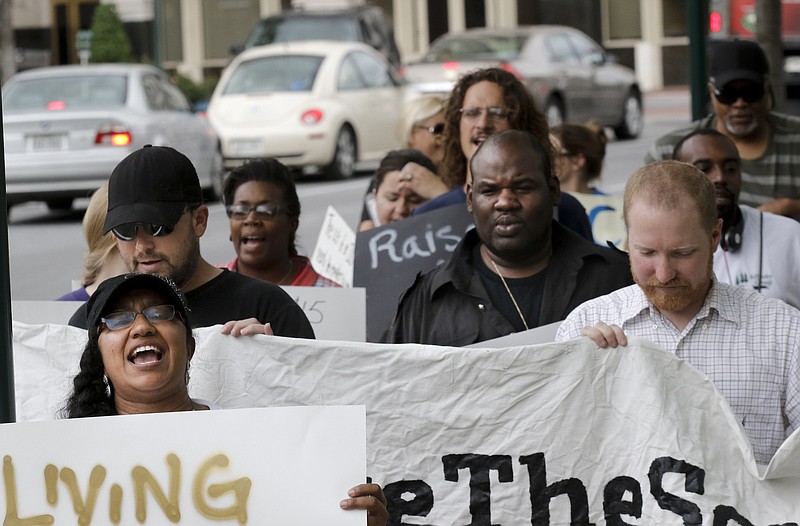Read more
Chattanooga to consider new city-wide minimum wage
Last week, Chattanooga City Councilman Moses Freeman asked his fellow council members to step out of their lane and sponsor legislation to set a local minimum wage.
He asked the city attorney to start researching how the city can lead the charge because inaction at state and congressional levels has kept local workers in poverty.
"It's time that we look into it. We are not getting any leadership at the state or federal levels," Freeman said. "I think workers here who are at the federal minimum - that's $7.25 an hour - that is not enough in today's world to keep workers out of poverty."
He's correct. Furthermore, other cities have done it: Los Angeles, Seattle, San Francisco, to name a few.
But those cities are not in Tennessee - a state with a 2013-passed law that prevents cities from raising the minimum wage within their boundaries, and a state that in 2014 had the nation's highest share of workers paid at or below the minimum wage, according to the U.S. Bureau of Labor Statistics. About 1 out of every 14 of Tennessee's 1.6 million hourly workers earned just $7.25 an hour or less.
At least three of Chattanooga's nine council members have said they would support raising the wage for all of Chattanooga (city employees working hourly already make a minimum of $11.68 an hour), but against the state's wage-rigged odds, improved local paydays for all residents to close wage gaps are unlikely.
Although Tennessee is at the bottom of wage floor, it's not alone - especially in the South and Midwest where states are mostly governed by Republicans who incorrectly argue that raising the minimum wage costs jobs and hurts the very people it is intended to help.
Goldman Sachs research shows otherwise. The investment banking company studied 13 states that in 2014 did increase their minimum wage. Goldman Sachs found that those states have since had faster employment growth than the states where the minimum wages remained at 2013 levels.
As for cities, Seattle's and Santa Fe's mandated minimum wage increases did not cost jobs, according to Michael Reich, a Berkeley economics professor with the Institute for Research on Labor and Employment.
"Our data show that an increase up to $13 an hour has no measurable effect on employment," he told the Seattle Times after that city raised its wage from $6.75 to $10.74 in increments over a decade ending in 2014.
FOX news listeners heard a slightly different story this past July after Seattle raised its minimum to $11 an hour in April and announced plans to raise it to $15 by 2018.
"Some people have figured out that with the pay raise they'll make too much money to stay on certain welfare programs," said Dan Springer, a Seattle-based Fox correspondent. "It turns out a lot of minimum-wage workers are eligible for basic food assistance, help with the cost of child care and government-subsidized rent. In the past few months some of them have asked their bosses for fewer work hours because they're afraid of losing their benefits. This runs counter to one of the big arguments for a $15 minimum wage - that it will lift people out of poverty."
Well, yes, it will lift them out of poverty, and therefore not only is it not "counter" to its goal, but it's also saving taxpayer dollars for those government subsidies that Fox and its watchers often wrinkle their collective noses about. Apparently corporate welfare to subsidize employer payroll costs is acceptable.
Chattanooga will not have Seattle success or, as Fox put it, "unintended consequences." That's because Tennessee lawmakers will stand in the way of change. For us, the misguided consequence will be a continued prevalence of low-wage jobs in a city where 27 percent of residents live below the poverty line (compared to 15 percent nationwide). Women head 42 percent of the our poor households, and 42 percent of Chattanooga children are poor (nearly double the rate statewide).
Overall, Chattanooga's median household income is $43,475 - nearly $8,000 lower than the national median household income of $51,371.
And don't be fooled by the outdated notion that minimum wage is mostly for teens in entry-level jobs. Today, more than half of those who make $9 an hour or less are age 25 or older.
Council members are right to seek a higher minimum wage for workers in other businesses within our city limits. Lower incomes work as much against all city residents as they do against our poorest residents. Smaller paydays mean less buying, lower tax revenues, less public money for needs such as schools and streets and safety systems.
Mayor Andy Berke puts it this way: "A rising minimum wage helps hard-working Chattanoogans support their families and ultimately aids businesses by creating more income to be spent throughout the city."
Our city and council members may be rebuffed by state lawmakers for now, but this fight is a smart and worthy one. Perhaps someday it will fall on wiser and more friendly ears.
